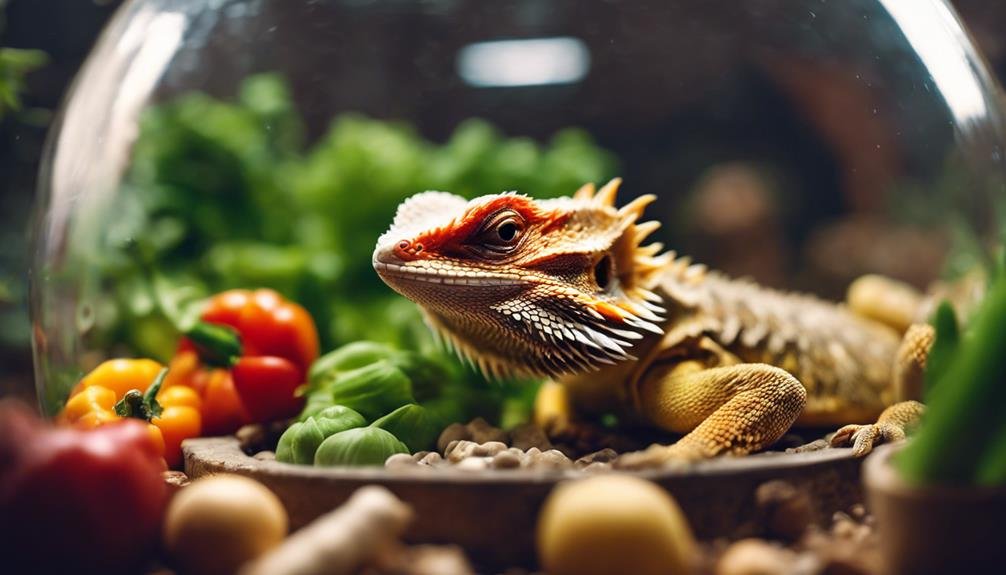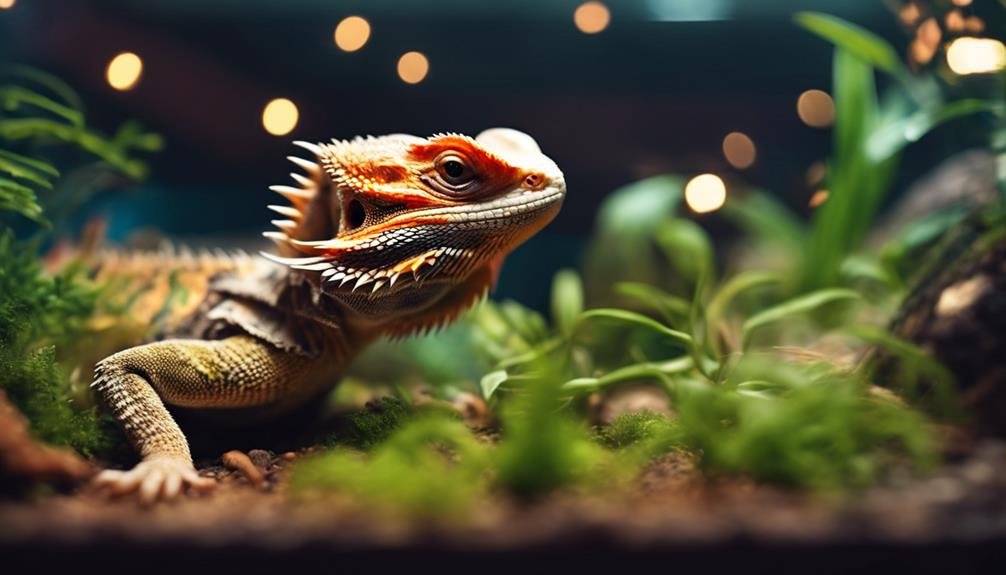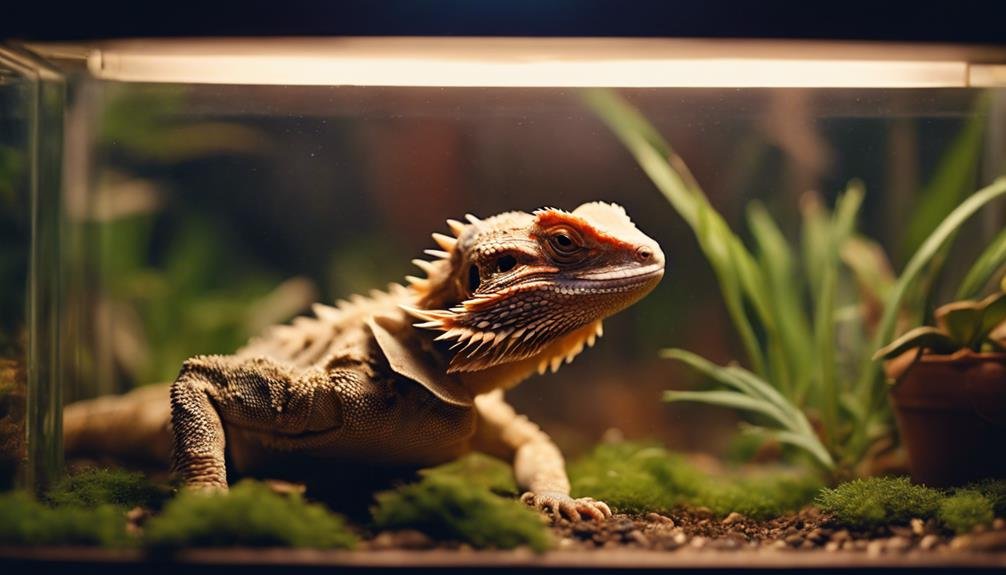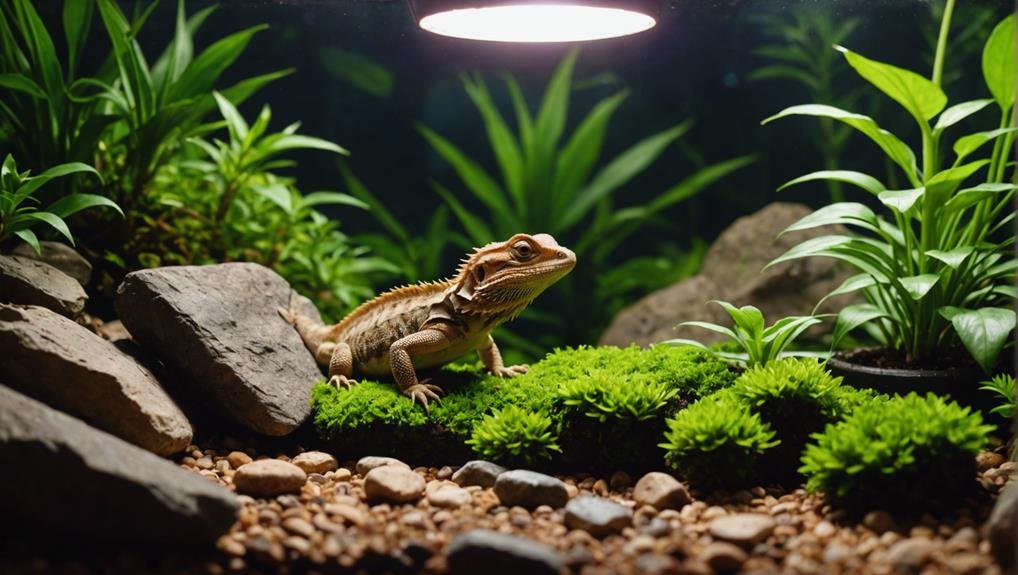When considering a bearded dragon as a pet, you’ll want to know how long they typically live in captivity. On average, these fascinating reptiles can live 10-15 years, but with exceptional care, some might even reach up to 20 years. Factors like diet, habitat conditions, and genetics greatly impact their longevity. If you’re committed to providing the best care, you might wonder what steps can make a difference in their lifespan. Let’s explore the vital aspects that can help guarantee your bearded dragon thrives for years.
Key Takeaways
- Bearded dragons typically live 10-15 years in captivity.
- With optimal care, some bearded dragons can reach up to 20 years.
- Quality of diet and habitat significantly impact their lifespan.
- Genetics and breeding practices influence overall health and longevity.
- Proper quarantine and environmental conditions are crucial for a long life.
Typical Lifespan of Bearded Dragons


Bearded dragons in captivity generally live between 10 and 15 years, though some exceptional individuals can reach up to 20 years with proper care. If you’re thinking about getting a bearded dragon, it’s important to understand the commitment involved. Your pet can thrive and surpass the average lifespan with the right dragon care.
Ensuring your bearded dragon lives a long, healthy life starts with creating an ideal habitat and providing a balanced diet. Regular veterinary care is essential, particularly as your dragon ages. Older dragons may require more frequent check-ups to monitor for common age-related health issues, ensuring any potential problems are caught early.
Proper care doesn’t just mean meeting basic needs; it involves paying attention to details like temperature regulation, UVB lighting, and hydration. These factors are essential for maintaining a bearded dragon’s health and longevity. Additionally, social interaction and mental stimulation can significantly impact their overall well-being.
Factors Affecting Longevity
Have you ever wondered what factors can greatly impact the longevity of your bearded dragon in captivity? Several key elements are important in determining how long your bearded dragons live.
One primary factor is the quality of care they receive. Proper husbandry practices, like ensuring adequate UV light exposure, are essential for preventing health conditions that can shorten their lifespan.
Inbreeding and genetic issues can also affect the longevity of bearded dragons. These problems can lead to congenital health conditions that reduce their overall lifespan. Additionally, bearded dragon females may experience complications related to egg production if they don’t receive appropriate care and environment.
Another critical aspect is the implementation of proper quarantine procedures. Without this, your bearded dragons may contract diseases or sustain injuries that could negatively impact their health and longevity.
Providing a suitable environment with lighting, heating, and overall farming is crucial for their well-being.
Importance of Diet


Ensuring a well-rounded diet is essential for the longevity and health of your bearded dragon in captivity. Bearded dragons need a mix of live insects and vegetables to thrive. A well-rounded diet supports their physical well-being and contributes greatly to their lifespan.
Live insects, such as Dubia roaches, are particularly beneficial as they provide excellent nutrition and are rich in proteins and essential fats. Incorporating a variety of feeder insects into your bearded dragon’s diet ensures they receive diverse nutrients necessary for their growth and vitality. Dubia roaches are a top choice among live insects due to their high protein content and easy digestibility.
Offering a range of vegetables, greens, and insects is crucial. Essential greens like collard, mustard, and dandelion greens supply vital vitamins and minerals. Avoiding harmful foods like avocados and mushrooms is equally important to maintain your bearded dragon’s well-being. These foods can be toxic and detrimental to their health.
Habitat Conditions
A well-maintained habitat is critical for the health and longevity of your bearded dragon. Proper care involves setting up a terrarium that meets their specific needs. Bearded dragons thrive in environments that mimic their natural habitat, so paying attention to lighting, temperature, and space is essential.
A spacious terrarium with proper lighting and heating greatly impacts their health. You should maintain a temperature gradient, allowing your bearded dragon to thermoregulate. Ensure there’s a basking spot with temperatures around 95-110°F and a cooler area at about 75-85°F. UVB lighting is also vital for their bone health and overall well-being.
Maintaining a clean environment in the terrarium helps prevent health issues and promotes a longer life. Regularly monitor and adjust habitat conditions, such as temperature and UVB exposure, to keep your bearded dragon in top health.
Here’s a quick reference table for essential habitat conditions:
| Factor | Ideal Range | Importance |
|---|---|---|
| Temperature | 75-110°F (cool to basking) | Thermoregulation |
| UVB Lighting | 10-12 hours/day | Bone health, metabolic function |
| Terrarium Size | Minimum 40 gallons | Space for movement and growth |
| Cleanliness | Regular cleaning | Prevents health issues |
| Humidity | 30-40% | Respiratory health |
Role of Genetics


Genetics greatly influence your bearded dragon’s lifespan and overall health in captivity. When contemplating your pet’s genetic background, it’s vital to comprehend how various factors can affect its longevity.
Inbreeding is a significant concern, as it can lead to genetic issues and deformities that may shorten your bearded dragon’s lifespan. On the other hand, selective breeding practices aim to enhance desirable traits, which can positively impact their health and longevity.
Here are some key points to keep in mind:
- Genetics: The genetic makeup of your bearded dragon plays a critical role in its overall health and lifespan.
- Lifespan: Genetic factors can directly influence how long your bearded dragon lives, interacting with environmental conditions.
- Inbreeding: Avoiding inbreeding is essential to prevent hereditary health problems and deformities.
- Selective breeding: Purposeful breeding practices can help improve the health and lifespan of captive bearded dragons.
- Genetic diversity: Ensuring a diverse genetic pool reduces the risk of hereditary diseases and promotes longevity.
Health and Veterinary Care
Regular veterinary check-ups are essential for keeping your bearded dragon healthy and ensuring a long life in captivity. Providing proper health care isn’t just about regular visits to the vet; it’s also about daily practices that keep your dragon healthy. Caring for your bearded dragon involves proper hydration, a balanced diet, and appropriate habitat conditions.
You must know common health issues to keep your dragon in top shape. Early detection and treatment can greatly enhance your pet’s quality of life. Here are some common health issues to watch out for:
| Common Health Issues | Symptoms | Preventive Measures |
|---|---|---|
| Metabolic Bone Disease | Weak limbs, soft jaw | UVB lighting, calcium intake |
| Respiratory Infections | Wheezing, mucus | Clean habitat, proper humidity |
| Parasites | Weight loss, lethargy | Regular fecal exams |
| Dehydration | Sunken eyes, wrinkled skin | Proper hydration, misting |
| Impaction | Lack of appetite, bloating | Avoid loose substrates |
Regular veterinary check-ups help catch these issues early, ensuring your bearded dragon stays healthy. Always seek professional advice for any concerns. Following these guidelines can significantly extend your bearded dragon’s lifespan in captivity.
Stress Management


Ensuring your bearded dragon has a stress-free environment is essential for their overall well-being. Stress management plays a significant role in their health and longevity. Bearded dragons can become stressed due to improper handling, loud noises, or sudden environmental changes. Recognizing the signs of stress, such as loss of appetite, lethargy, and hiding behavior, will help you address issues promptly.
To create a calm environment for your bearded dragon, consider the following steps:
- Provide Hiding Spots: Ensure your bearded dragon has a few secure places to retreat when threatened.
- Maintain Consistent Routine: Keep a regular feeding and lighting schedule to avoid causing unnecessary stress.
- Avoid Overcrowding: Ensure the tank isn’t crowded with decor or other pets that might intimidate your dragon.
- Monitor Temperature: Maintain a stable temperature range to prevent sudden changes that can lead to stress.
- Observe Behavior: Regularly observe your bearded dragon’s behavior and adjust their environment.
Enhancing Lifespan
To enhance your bearded dragon’s lifespan, focus on providing a balanced diet and ideal habitat conditions. Bearded dragons eat various foods, including insects, leafy greens, and occasional fruits. Ensure their diet is rich in calcium and low in phosphorus to prevent metabolic bone disease. Avoid feeding them toxic foods like avocado and rhubarb.
Creating an ideal habitat is essential for your Inland Bearded dragon. They thrive in an environment that mimics their natural desert habitat. This means providing a spacious tank with a temperature gradient—basking spots should be around 100°F, while cooler areas can be around 75°F. Bearded dragons need UVB lighting to synthesize vitamin D3, essential for calcium absorption.
Regular veterinary check-ups are another key component for a long-lived bearded dragon. Please make sure they’re free from parasites and other health issues. Remember, how long bearded dragons live often depends on the care they receive.
Conclusion
By understanding and addressing the key factors that influence your bearded dragon’s lifespan, you can greatly enhance their quality of life and longevity.
Ensure they have a balanced diet, proper habitat conditions, and regular health check-ups.
Paying attention to their genetic background and managing stress levels will also contribute to their well-being.
You can enjoy many happy years with your bearded dragon companion with the right care and attention.


